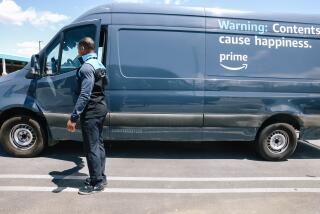UPS Ban on Deaf Drivers Is Rejected
- Share via
A federal appeals court ruled Tuesday that United Parcel Service Inc. illegally discriminated against hundreds of deaf employees by barring them from driving delivery vans.
The ruling could prompt employers to review their hiring policies and job requirements to make sure none of them exclude broad groups of people without a justifiable reason. Companies that fail to take such steps could find themselves vulnerable to similar suits from disabled employees.
In its decision, the San Francisco-based U.S. 9th Circuit Court of Appeals upheld a 2004 lower-court ruling that the parcel delivery company’s policy of denying driving jobs to hearing-impaired employees violated the Americans with Disabilities Act.
The appeals panel held that employers must justify policies or job requirements that automatically exclude a group of disabled people.
“If you want to use a physical criteria to exclude a whole class of people from a job, you need to be able to prove that substantially all the people with that criteria can’t do the job safely,” said Lawrence Gartner, a partner with Baker & Hostetler in Los Angeles who represents management in employment law cases.
UPS said it disagreed with the court’s ruling and would consider an appeal.
“We believe this case is about safety, and it has nothing to do with disability or discrimination,” said Laurie Mallis, a spokeswoman for the company.
Deaf UPS employees said the ruling raised their hopes that they would one day be allowed to drive for the company.
“I have been waiting for this opportunity ever since I started working at UPS,” said Barbaranti Oloyede, a UPS employee for 15 years.
“It has been my dream to drive a UPS package van. I can’t wait to sign up for a promotion,” Oloyede said.
The fact that other delivery companies use deaf drivers made UPS’ blanket exclusion a difficult policy to justify under a straightforward reading of the Americans with Disabilities Act, said Stanford University law professor Mark Kelman.
The disability act “generally demands highly individualized findings, and UPS wasn’t permitting very much individual analysis” of any deaf applicant’s qualifications for the job, he said. “They were just rejecting the hearing-impaired employees.”
The ruling puts employers in a “damned if they do and damned if they don’t” situation, said Joe Beachboard, a Los Angeles lawyer who represents employers.
If UPS doesn’t employ deaf workers as drivers, it can be sued under the disability act, he said. But if a deaf UPS driver has a serious accident, the company also could be sued.
“That’s the tension that employers face in these kinds of cases,” Beachboard said.
Tuesday’s ruling stems from a class-action lawsuit filed against UPS by hundreds of hearing-impaired would-be drivers.
Atlanta-based UPS had contended that deaf drivers posed a safety problem because of their inability to hear other vehicles.
U.S. Circuit Judge Marsha Berzon noted that UPS offered anecdotes of drivers avoiding collisions because they heard a warning.
But, she wrote, UPS “failed to show that those accidents would not also have been avoided by a deaf driver who has compensated for his or her loss of hearing by, for example, adapting modified driving techniques or using compensatory devices such as backing cameras or additional mirrors.”
The class-action plaintiffs persuaded the trial court and appellate panel with studies and analyses that showed “hearing is not an essential component of being a safe driver,” said Larry Paradis, a lawyer with the Berkeley-based Disability Rights Advocates, a nonprofit law firm, who represented the plaintiffs. That is why deaf people nationwide may be licensed to drive passenger cars, he said.
“UPS was just asserting an old stereotype,” Paradis said. “UPS adopted this policy without ever investigating whether it was necessary.”
The ruling sends the classaction case back to federal district court for a series of individual trials over compensation, which could include giving hearing-impaired employees priority for promotions into driving jobs, as well as lost wages and punitive damages.
The appeals panel took up the case after U.S. District Judge Thelton Henderson ruled against the company in 2004 and issued an injunction ordering it to stop requiring applicants to pass an examination, which included a hearing test and effectively kept deaf workers out of driving jobs.
That order was put on hold while UPS appealed.
Federal rules require drivers of vehicles weighing 10,000 pounds or more to meet certain vision and hearing standards. The rules let companies determine the qualifications for drivers of lighter vehicles.
*
*
Times staff writer Molly Selvin contributed to this report.
More to Read
Inside the business of entertainment
The Wide Shot brings you news, analysis and insights on everything from streaming wars to production — and what it all means for the future.
You may occasionally receive promotional content from the Los Angeles Times.











